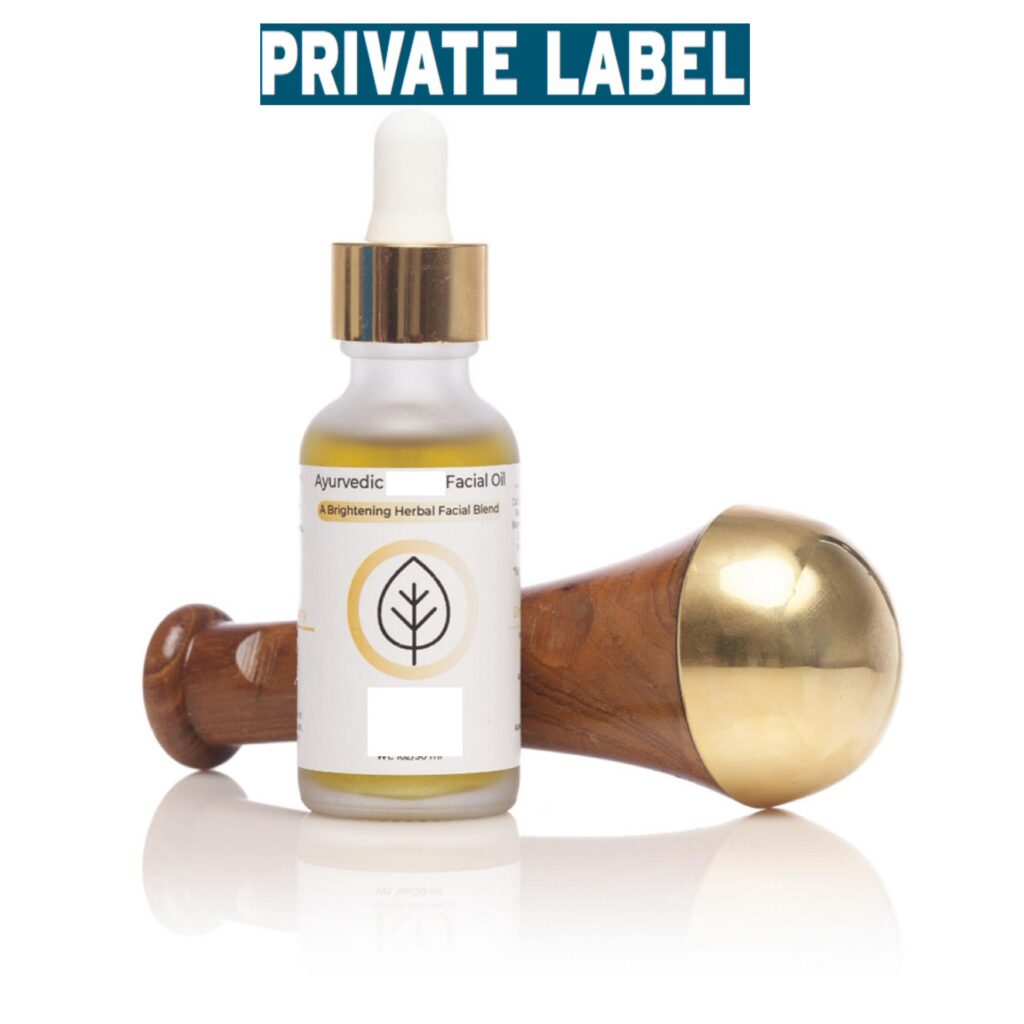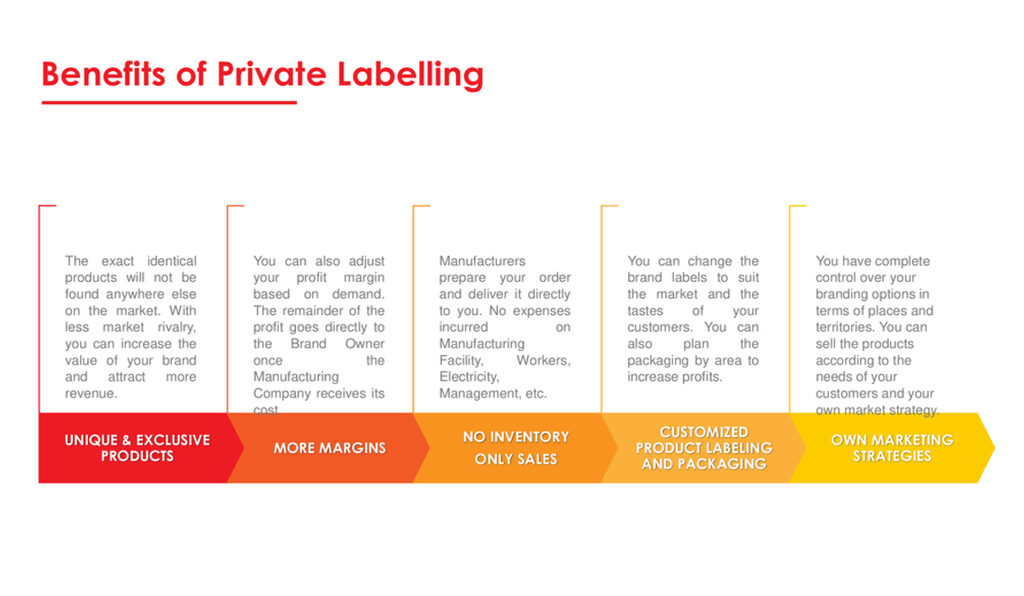
The idea behind private labeling is to work with a third-party manufacturer to create your own branded products. Private labeling is ideal for persons and businesses who already have a following and want to start making money online through product sales. You could generate over a million dollars in revenue just from Private Label business on a reputed marketplace platform in the first year. However, with the escalating competition, it is increasingly difficult to successfully launch your product.
| Table of Contents | |
| 1. What is private labeling? | |
| 2. Decide what you want to sell | |
| 3. How to find a potential fit private label manufacturer? | |
| 4. Build an e-commerce store and create brand | |
| 5. What makes private labeling so beneficial? | |
| 6. How much does private labeling cost? | |
| 7. A special tip: How BIG is the Ayurveda market? | |
| 8. Final Thoughts |
What is Private Labelling?
The private labeling of a product is a process in which a manufacturer or supplier creates products that are branded and sold by another company. The new company can recommend that the products be labeled and branded with its logos. Every time you shop, you probably see private label products.
Decide what you want to sell
In today’s hectic world, many individuals are looking for Alternative Ayurveda products to help them deal with a variety of health issues. Consumers have shown a willingness to adjust their purchasing habits throughout the pandemic. You can deliver the greatest quality to your committed clients while also enhancing your overall brand recognition with Ayurveda Private Label Products.
Analyze what you want to sell as you consider your options, but make sure to combine your tastes with market research. Here are a few methods for conducting market research to “validate” your ideas and guarantee that people are truly interested.
- Google trend: Enter your thoughts to discover if they’re trending up, down, or stable.
- Ubersuggest: This tool displays activity information such as the number of people who search for particular terms each month.
- Amazon best sellers: What are the hottest products right now? To laser-focus your efforts, you can search in numerous categories.
- Competition research: Who else is selling things that are similar to yours? Examine their website, social media, and customer reviews.
Typically, you should choose a product that is selling for $25 or less, and the landing cost should be between 20%-30% of the selling price.
How to find a potential fit private label manufacturer?
Setting aside time to speak with at least a few different manufacturers is critical. Here are some critical factors to remember when talking to manufacturers and negotiating with them.
- Minimum Order Requirement: Look for private label partners that don’t need you to buy in big quantities, especially if you’re just getting started.
- Product Selection: Look for a private label partner who has a wide range of items and varieties so you may increase your options in response to client feedback and current trends.
- Pricing: Ascertain that you have a reasonable profit margin on the products you sell.
- Turnaround time: Look for a manufacturer that can ship your orders within a week or two to keep your cash flow and stock levels manageable.
- Availability of products: Check with your manufacturer to ensure that out-of-stock situations are uncommon and that they can help you prepare for greater orders if necessary.
- Sales Support: Look for a private label manufacturer that offers professional and competent sales support so you’re not left guessing when it’s time to market your items.
- Quality: The presence of recognized ingredients is an effective route to determining a high-quality private label product.
- Facility & Product Certification: Consumer confidence is boosted by credible certificates and labeling, which leads to increased sales. To meet your goals of delivering high-quality, trend-setting products to your consumers, you must be sure that your manufacturing partner can provide certifications such as GMP, USDA, USDA Organic, Vegan, or Non-GMO.
Build an e-commerce store & create brand
Once you’ve found a manufacturer, it’s time to bring your concept to life. To get started, you can choose from thousands of free or paid web design templates, or you can contact GeopFX for end-to-end services. When we design your store, here’s a checklist to keep in mind.
- Assist you with a complete business plan: Market, Product, Manufacturer selection, Pricing, Break-even analysis, and many more
- Assist in creating a brand, a great website (either customized, Shopify or WordPress & killer marketing plan to boost your sales
- Help create a market with the target audience with our bouquet of Digital Marketing services.
- Setup of People & Process for continued sustainable business operations.
What Makes Private Labeling So Beneficial?
You can rapidly start a business by white or private labeling an existing product. You may personalize the purchasing experience by using branding, a great website, and unique packaging. Selling white-label products does not necessitate any prior expertise or skill.

Now the BIG question! How much does private labeling cost?
To start a private labeling firm, you’ll need at least $1,000–$1,500. The bulk of your costs will be spent on acquiring samples and setting up your business’s logistics, such as your website, payment processing, and order fulfillment.
When launching a Private Label product, you must account for different costs:
Essential & compulsory costs
| Type of cost | Cost range ($) |
| Product cost | $500 – $1000 |
| Shipping Cost* | $150 – $500 |
| Barcode purchase | $10 – $60 |
| Marketplace monthly fee (Professional) | $40 |
| Samples | $30 – $200 |
| Photography | $150- $500 |
| Product research | $50- $100 |
| Listing service | $30 – $300 |
Optional Cost
| Type of cost | Cost range ($) |
| Logo | $20 – $100 |
| Label | $100 – $500 |
| Inspection | $100 – $500 |
| Marketplace PPC Ad | $100 – $500 |
A Special Tip: How BIG is the Ayurveda market?
With World Health Day approaching on April 7th, the Prime Minister recalled AYUSH and underlined how Ayurveda products are reaching new heights. The market is presently valued at USD 10 billion, and it is expected to grow by 50% in the next five years.
To expedite the acceptance of AYURVEDIC practices, All India Institute of Ayurveda (AIIA) is aggressively striving to create an environment that supports research and development, as well as the establishment of practices, technologies, and solutions. To fully exploit the potential of Ayurveda science, a robust ecosystem with enterprises operating across the entire value chain is required. This sector offers great investment opportunities with increased awareness of wellness and health-related activities, whether it’s setting up of specialized ready to eat nutritious food, Bio-instrumentation (3-D printed medical devices, Telehealth, Instrumentation, drug ATMs), or IT solutions (AI, virtual reality, biosensors & trackers).
Given the high set-up costs and commitment required, not everyone can become a manufacturer; nonetheless, private-labeling a product creates a win-win situation for both the original manufacturer and whoever accepts to resale it. Another key reason is that when the economy slows and the external environment is uncertain, the market share of private-label items tends to rise. Private-label quality levels are far higher and more consistent than they have ever been, especially in categories where there has been little product innovation in the past. Consumers’ search for better pricing in the face of extended economic uncertainty may keep the private-label boom going for a while longer.
Final Thoughts
Private labeling is the “happy medium” for beginning an online business for many new and seasoned entrepreneurs. Now that you understand what private label products are and how they work, you can put your million-dollar plan into action and start your own private label company.
Get a preview of a business plan of your chosen private label product and get start your business towards a Geop scale.



1 Comment
Comments are closed.